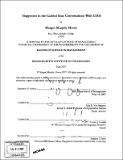| dc.contributor.advisor | John E. van Maanen. | en_US |
| dc.contributor.author | Murphy Moore, Margot | en_US |
| dc.contributor.other | Sloan School of Management. | en_US |
| dc.date.accessioned | 2007-11-16T14:15:49Z | |
| dc.date.available | 2007-11-16T14:15:49Z | |
| dc.date.copyright | 2007 | en_US |
| dc.date.issued | 2007 | en_US |
| dc.identifier.uri | http://hdl.handle.net/1721.1/39512 | |
| dc.description | Thesis (S.M.)--Massachusetts Institute of Technology, Sloan School of Management, 2007. | en_US |
| dc.description | Includes bibliographical references (leaves 83-87). | en_US |
| dc.description.abstract | Accomplished individuals should, by all modern definitions, be happy. They have achieved the power, authority, influence, and wealth that many in the American capitalist society aspire towards. But what defines happiness once you are there? When you are sitting in Thurber's proverbial "catbird seat," what is happiness? In conversations with 18 senior leaders of Fortune 1000 companies, guided by scripted questions posed by the author, the leaders responded to inquiries about their understanding of happiness, the influencers of happiness, the role of personal happiness in success, and their personal definition of happiness. The conversations, complemented by two standardized questionnaires, developed three thematic components of happiness. Social relationships, personal focus, and a sense of thresholds were revealed as the most consistent dimensions of personal happiness. These themes synthesize much of the existing literature on happiness where happiness is often divided into two definitions: eudonic: happiness derived from virtuosity, and hedonic: happiness derived from pleasure and the avoidance of pain. The conversations combined these theories and integrated life lessons from leadership to produce a theorem of sorts: Happiness exists in the enjoyment of virtuosity. Virtuous pain exists in vain. | en_US |
| dc.description.statementofresponsibility | by Margot Murphy Moore. | en_US |
| dc.format.extent | 87 leaves | en_US |
| dc.language.iso | eng | en_US |
| dc.publisher | Massachusetts Institute of Technology | en_US |
| dc.rights | M.I.T. theses are protected by copyright. They may be viewed from this source for any purpose, but reproduction or distribution in any format is prohibited without written permission. See provided URL for inquiries about permission. | en_US |
| dc.rights.uri | http://dspace.mit.edu/handle/1721.1/7582 | |
| dc.subject | Sloan School of Management. | en_US |
| dc.title | Happiness in the catbird seat : conversations with CEOs | en_US |
| dc.type | Thesis | en_US |
| dc.description.degree | S.M. | en_US |
| dc.contributor.department | Sloan School of Management | |
| dc.identifier.oclc | 173845179 | en_US |
